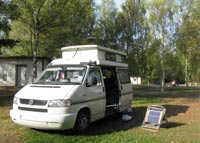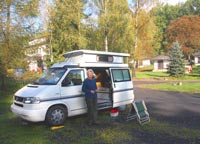CAMPSITES in
CZECH REPUBLIC:
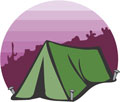


 Top
of page Top
of page
|
Campsites: there is a ready
availability of campsites (Kemping or Autocamp
abbreviated to ATC) across the Czech Republic especially in the more
touristy parts of the country where many are ultra luxurious with every form of
distraction and prices to match. Many however are still relatively undeveloped,
having evolved from chalet-huts (chaty) encampments which provided cheap
holiday accommodation dating back to
the Communist era. Many campsites still have chaty,
some now looking rather woe-begone, but still used; other
campsites form an annexe to hotels, pensions or leisure
complexes. Even in the less visited parts of Moravia and
Northern Bohemia, it is still possible to find campsites, albeit of variable
standards. We toured the whole country in late summer 2009 and our experience of
campsites is summarised in our Campsites Review:
 Review
of Czech campsites Review
of Czech campsites
We attach great significance to
the attitude shown on arrival and standards
are variable: there is no national accreditation process for
campsites and despite the transition to market economy since
1990, commercial
competitiveness seems to have made variable impact. Where campsites were private
or family-run, campsite owners generally were hospitably welcoming and helpful;
at larger sites however, employed staff tended to show
casual and indifferent attitudes
clearly indicating no awareness of the link between
commercial success/failure, and therefore their jobs, and levels of hospitality towards their guests. As the
number of Western European visitors increases, demanding higher
standards and bringing greater competitiveness, some Czech
campsite owners are going to have to attend a charm course
or go out of business.
With some notable exceptions,
the majority of sites we experienced had fairly basic and old-fashioned standards of facilities
but generally were clean with hot water, and many had
cooking facilities (common in Eastern Europe) with wash-ups
(kuchyna lit. kitchen).
Websites
listing Czech campsites: there is no single
organisation or web site listing all campsites to help with pre-trip planning. The Dutch camping organisation ACSI web site selectively lists its favoured sites
and includes the Google mapping facility as a helpful means of
pinning down a campsite's location. ACSI accreditation however does not
guarantee acceptable standards: some of our lowest rated sites were ACSI
recognised, which maybe says something about its dubious value. They also
tend to attract hoards of noisy Dutch caravaners in August - be warned.
The most useful web sites we found, none of them complete and
often missing essential details of opening/closing dates,
were:  Czech-Camping Czech-Camping
 ACSI -
Czech Republic ACSI -
Czech Republic
 Europe Camping Guide - Czech Republic Europe Camping Guide - Czech Republic
 Interhike - Czech Republic Interhike - Czech Republic
 Camp CZ Camp CZ
Campsite opening
dates: the camping season is quite short with
campsites opening from April/May to September; outside these
times, it is still possible to find a few open sites as our review shows; there
are even a few all-year-round sites.
Campsite prices: prices charged varied
enormously and generally reflected the greed of the owners
rather than the standards offered, with the most reasonable prices at campsites graded at 2 stars or less.
The cost of living in the Czech Republic (reflecting much lower
income levels) still represents remarkably good value by our inflated West European
standards. Expect to pay between
250Kč and 380Kč (with the exchange rate at around 30Kč, this translates as Ł8.30 and Ł12.60) for a night's camp, although in August the more elaborate sites will
charge considerably more. In our
Campsites Review,
we give the nightly charge we paid; prices
may include a local tourist tax.
Wild-camping: in the more remote and hilly areas, with awareness of potential
security issues and basic common sense and courtesy,
wild-camping is certainly practicable though with the number of reasonably
priced campsites, rarely necessary.
|





 You
should obtain a European Health Insurance Card (EHIC) before
leaving the UK, and carry your EHIC with you at all times in case of emergency. The EHIC is not a substitute for medical
and travel insurance, and only entitles you to emergency
medical treatment on the same terms as Czech nationals. It does not cover you for medical repatriation, on-going
medical treatment or treatment of a non-urgent nature. It is
essential therefore to have comprehensive
travel insurance.
You
should obtain a European Health Insurance Card (EHIC) before
leaving the UK, and carry your EHIC with you at all times in case of emergency. The EHIC is not a substitute for medical
and travel insurance, and only entitles you to emergency
medical treatment on the same terms as Czech nationals. It does not cover you for medical repatriation, on-going
medical treatment or treatment of a non-urgent nature. It is
essential therefore to have comprehensive
travel insurance.




 Camping
Gaz is simply unavailable in the Czech Republic; we failed to find any
opportunity to exchange Camping Gaz 907 cylinders or even semi-legitimate sources
of re-filling empty cylinders. It is essential therefore to take
sufficient for your planned period of stay in the country.
Camping
Gaz is simply unavailable in the Czech Republic; we failed to find any
opportunity to exchange Camping Gaz 907 cylinders or even semi-legitimate sources
of re-filling empty cylinders. It is essential therefore to take
sufficient for your planned period of stay in the country.


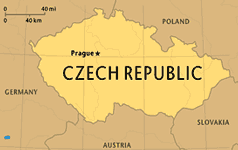
 For
planning and 'big picture' general
use, the most useful overall maps of the Czech Republic are those published by
Rough Guide (1:350k) and Michelin (sheet no 755 - 1:450k); details on The Map Shop web site.
For
planning and 'big picture' general
use, the most useful overall maps of the Czech Republic are those published by
Rough Guide (1:350k) and Michelin (sheet no 755 - 1:450k); details on The Map Shop web site.
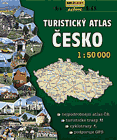 Walking
maps can be expensive and variable in quality, but the most economic
solution is the 1:50k Ring-bound Atlas of the Czech Republic
(Turistický Atlas Česko) (see right) published by Shocart. Although this seems ultra-expensive
at Ł58.50, it does cover the entire country and the mapping is
of excellent quality. Where
ever you are, simply extract from the ring-binder the
relevant sheets and carry them with you in the provided
plastic wallets
Walking
maps can be expensive and variable in quality, but the most economic
solution is the 1:50k Ring-bound Atlas of the Czech Republic
(Turistický Atlas Česko) (see right) published by Shocart. Although this seems ultra-expensive
at Ł58.50, it does cover the entire country and the mapping is
of excellent quality. Where
ever you are, simply extract from the ring-binder the
relevant sheets and carry them with you in the provided
plastic wallets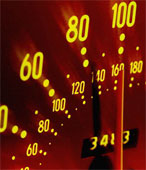
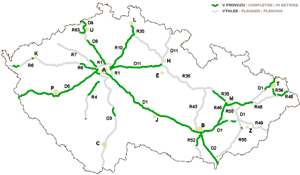 Road
standards: the Czech Republic has benefitted by huge amounts of EU
development funds in recent years; as
a result road conditions
and signposting are generally good on
both main and minor roads.
Road
standards: the Czech Republic has benefitted by huge amounts of EU
development funds in recent years; as
a result road conditions
and signposting are generally good on
both main and minor roads. 220Kč
220Kč
 (Ł7.30)
(Ł7.30)
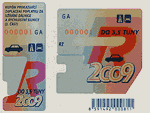 for 7
consecutive days and can be bought
at border-crossings, post-offices
and garages. The
vignette comes in two parts (see left): stick the main part in the windscreen
bottom right
hand corner; write your vehicle registration number on
the left part and keep it in case of being stopped. Do not be tempted to drive
on a motorway or highway without a vignette; unmarked
police cars do patrol and penalties for failing to have a vignette are costly.
for 7
consecutive days and can be bought
at border-crossings, post-offices
and garages. The
vignette comes in two parts (see left): stick the main part in the windscreen
bottom right
hand corner; write your vehicle registration number on
the left part and keep it in case of being stopped. Do not be tempted to drive
on a motorway or highway without a vignette; unmarked
police cars do patrol and penalties for failing to have a vignette are costly.


 The Czech Republic has a
long-established record of brewing and no visit to the
country would be complete without enjoying their wonderful beers.
Their bottom fermented beers are as unlike the
overpriced, tasteless, chemicalised lager-fizz served in English pubs as the
proverbial chalk and cheese. The different Czech brewing companies
all produce distinctively tasting products, all using natural ingredients -
Moravian barley and Red Saaz hops from the
Žatec region of Bohemia (
The Czech Republic has a
long-established record of brewing and no visit to the
country would be complete without enjoying their wonderful beers.
Their bottom fermented beers are as unlike the
overpriced, tasteless, chemicalised lager-fizz served in English pubs as the
proverbial chalk and cheese. The different Czech brewing companies
all produce distinctively tasting products, all using natural ingredients -
Moravian barley and Red Saaz hops from the
Žatec region of Bohemia (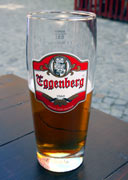 Given the
zero alcohol policy for drivers, most of the brewers produce
an alcohol-free beer (Nealkoholické pivo or simply Nealko)
which, unlike its English equivalent, is reasonably
acceptable in taste. Unlike most continental countries, Czech pubs still
function as a social gathering place more akin to the atmosphere of an English
pub; the beers are good too, and cost typically 30Kč for 500ml (Ł1 a pint)!
Given the
zero alcohol policy for drivers, most of the brewers produce
an alcohol-free beer (Nealkoholické pivo or simply Nealko)
which, unlike its English equivalent, is reasonably
acceptable in taste. Unlike most continental countries, Czech pubs still
function as a social gathering place more akin to the atmosphere of an English
pub; the beers are good too, and cost typically 30Kč for 500ml (Ł1 a pint)!